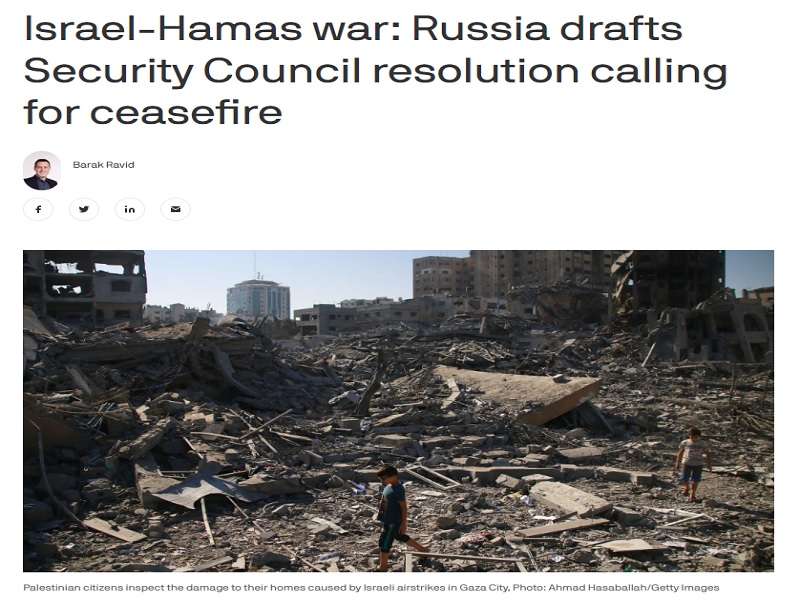Russia’s Permanent Representative to the UN Vasily Nebenzia revealed on Friday that his country has drafted a ceasefire aimed at preventing an unprecedented humanitarian crisis from unfolding in Gaza. His full remarks to the press following that day’s UNSC consultations on the Middle East can be read here, but the gist is to stop the fighting at least long enough for civilians to safely evacuate. A hostage/prisoner swap could buy enough time for this, after which the peace process might restart.
Nobody should be under any illusions that this noble effort will succeed due to the near-certainty that the US will ultimately veto it out of biased solidarity with Israel, though it could nevertheless still serve to powerfully reshape global perceptions about what’s on the brink of coming to pass. Ambassador Nebenzia echoed President Putin’s comparison earlier that day of Israel’s blockade of Gaza to the Nazis’ blockade of Leningrad that resulted in the death of his older brother before he was born.
He also decried Israel’s unrealistic demand for over one million civilians to flee south within 24 hours into what he described as a de-facto ghetto along the Egyptian border. Although both the Ambassador and Head of State reaffirmed Israel’s right to self-defense, they both believe that its response to Hamas’ terrorist attack last weekend is grossly disproportionate. The innuendo is that the self-professed Jewish State squandered whatever support it could have otherwise had among most of the global community.
If Israel’s ground operation begins before civilians have safely evacuated from the conflict zone, which is extremely difficult for many of them to do amidst incessant airstrikes carried out during the newly imposed blockade of their homeland, then an unprecedented humanitarian crisis will unfold. This worst-case scenario might be inevitable, but Russia’s draft ceasefire will at least show that well-intentioned efforts were made to avert it, especially if a large number of countries cosponsor it.
In that event, it’ll become a matter of historical record that this tragedy was avoidable but wasn’t prevented due to Western governments’ support for Israel’s bloodlust after Hamas’ terrorist attack, the reasons of which are speculative but can be partially attributable to geopolitics. The US and its allies regard Israel as their “unsinkable aircraft carrier” that must always be supported in security matters despite occasional disagreements because it serves to divide-and-rule the region to their benefit.
Objectively speaking, Israel’s interests and those of nearby countries like Saudi Arabia are best served by continuing the normalization process that could then unlock mutually beneficial economic opportunities, but that best-case scenario might become impossible if the impending humanitarian crisis unfolds. Riyadh already reportedly put its talks with Tel Aviv on ice in response to the latter’s bombing of Gaza, and it could completely abandon this policy if its co-religionists there continue being slaughtered.
Israel must therefore be saved from itself in a sense since the bloodlust of its present leadership’s most ideologically extreme elements threaten its aforesaid objective interests and the associated greater good of the region. The draft ceasefire put forth by Russia, whose balanced approach towards the latest Israeli-Hamas war has positioned it as the only truly neutral stakeholder in this conflict, is therefore likely the last chance to prevent West Asia from sliding back into a self-sustaining cycle of destabilization.
